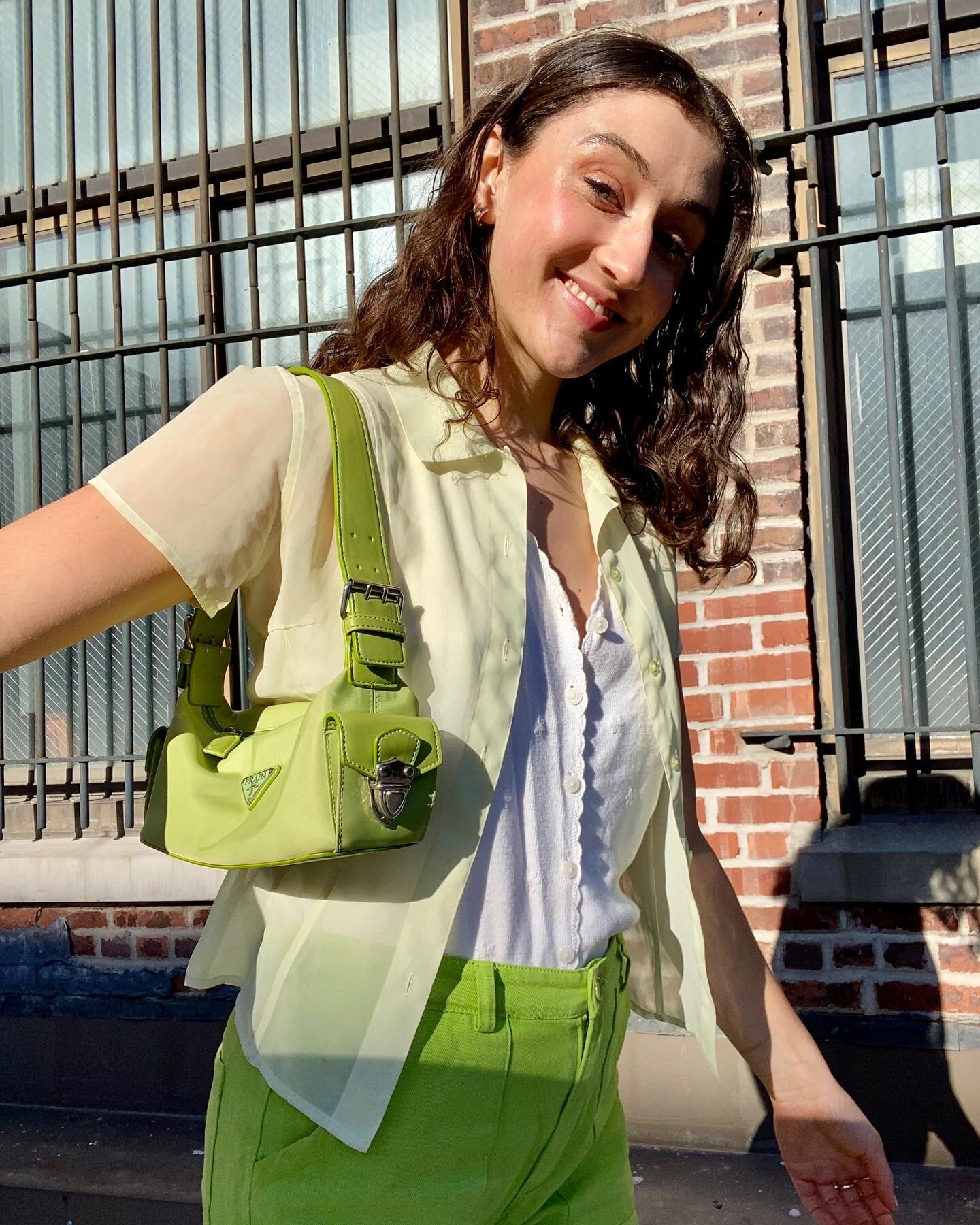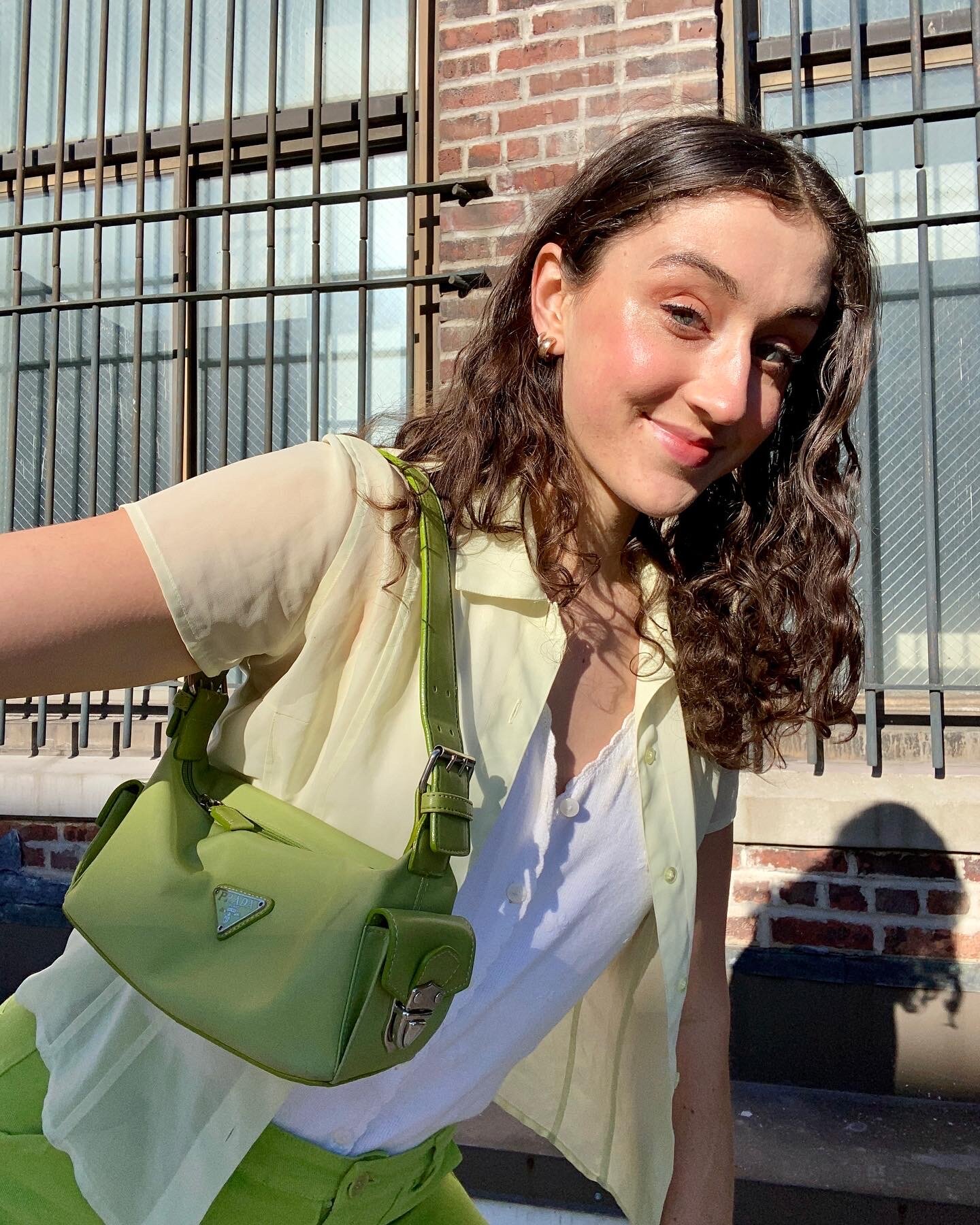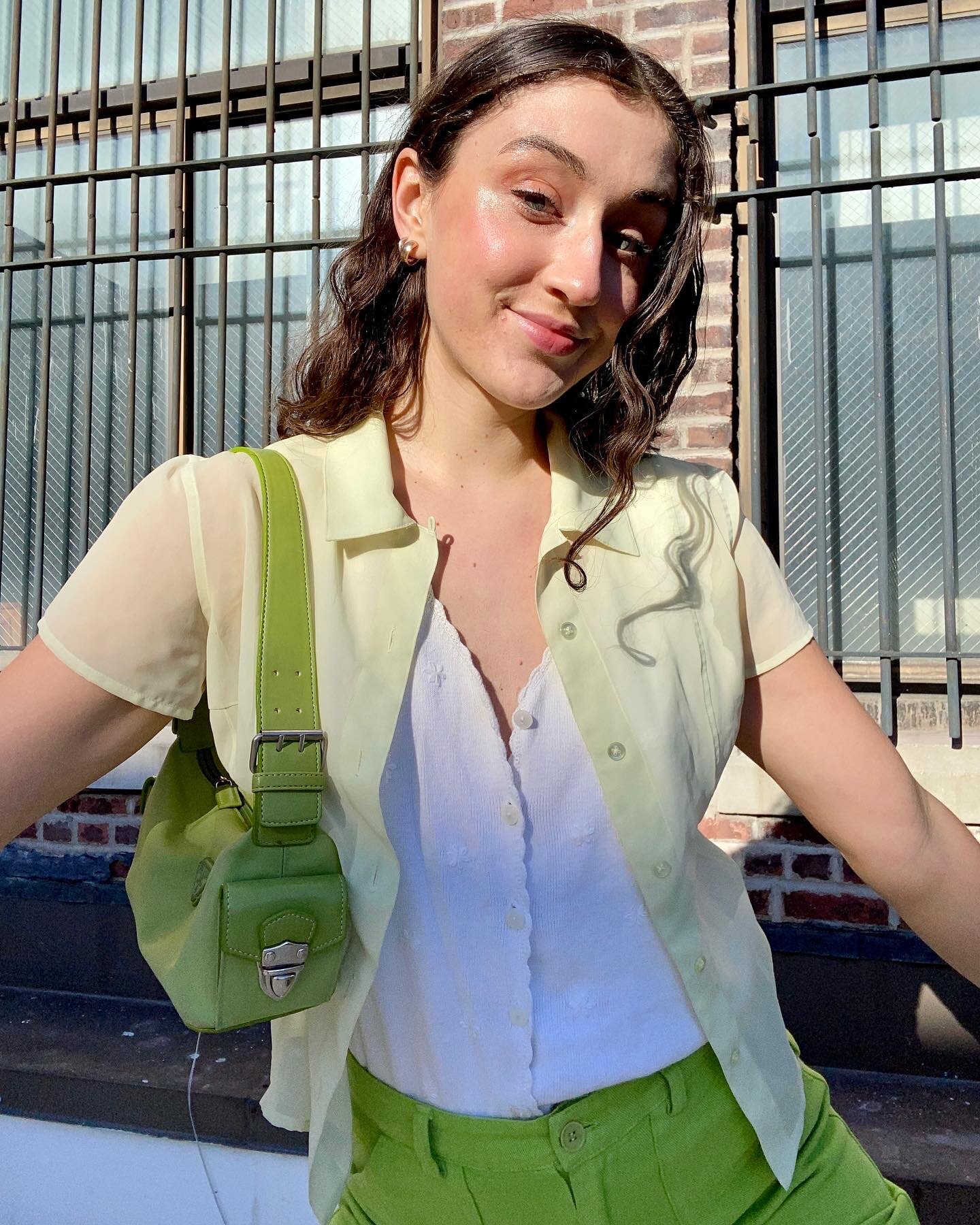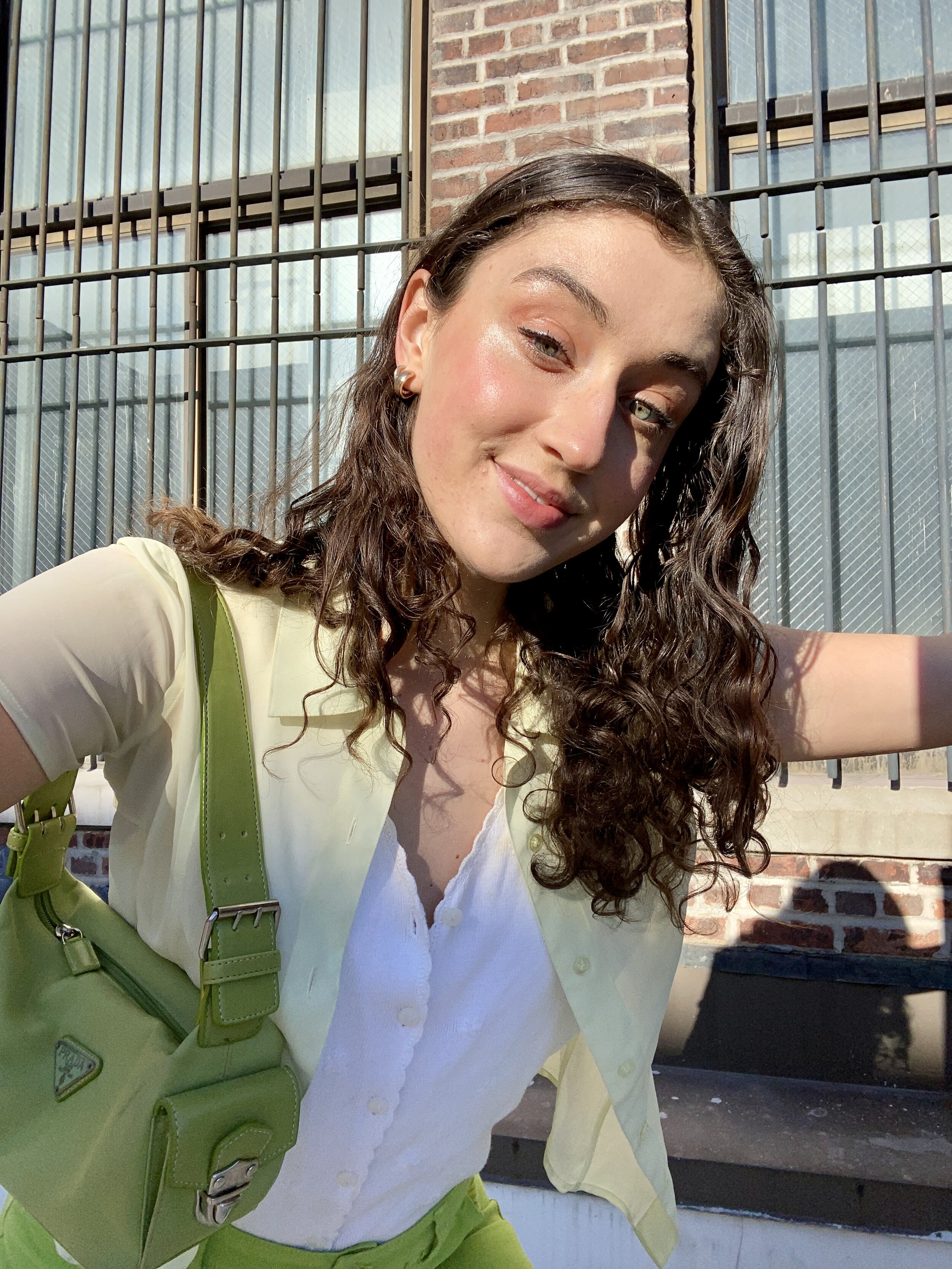Kate Glavan: A Gen Z Content Creator Passionate About Politics, Wellness, and Climate Change
What the F*ck is Sea Moss? Not only is this a question I’ve asked myself, it’s also the name of Kate Glavan’s podcast, which she co-hosts with her fellow sea moss girlie, Emma Roepke. On the pod, the 22-year-olds answer all kinds of health and wellness questions in hopes of increasing awareness on the importance of self-care and normalizing realistic relationships with food.
But that’s not where I originally came across Kate’s content. I found Kate on Instagram last summer, where she has created a platform based on her passions: government, food politics, environmental activism, fashion sustainability, and wellness. Want to know more about the Senate filibuster? The future of the GOP? Veganism and the climate crisis? She’s got you covered. And as someone who has a surface-level understanding of politics, what struck me the most about Kate’s page was how comprehensive the information she shared was. I was inspired, invested, and intrigued. How does someone so young know so much about, well, so much?
It turns out that Kate and I have more in common than I thought. Like many of us, Kate wondered “what the hell” she was going to study when she went to college. She didn’t want to find herself stuck in core curriculums and pre-made academic tracks. Strangely enough, she also didn’t see herself getting into politics, though it remains one of her greatest passions. “I'm a very vocal, loud woman. I could not work in politics,” Kate says, “I dress in a very eccentric way.”
Growing up with a lack of representation in her elected representatives, Kate couldn’t see herself sitting in cubicles “full of white men.”
“For some reason, I had internalized that an interest in fashion minimized my intellectual capacities,” she explains. “Now I’ve grown to realize I should step into my power and embrace all of my interests, not hide different parts of myself such as fashion just because I want to do work in politics one day.”
This feeling that she might not fit into a world she was passionate about is common amongst young people. Choosing a college major can be intimidating, let alone choosing a career. When Kate moved from her home state of Minnesota to New York City, she chose to study at NYU’s Gallatin School of Individualized Study. There, students can create their own major, which allowed Kate to dabble in her various academic interests. “I was really, really inspired by this niche of [activism and fashion politics] throughout different media cultures,” Kate says.
The more she concentrated on politics, the more Kate realized it was what she wanted to do in the future. NYU professors like Christine Harrington, who teaches administrative law and politics, encouraged Kate and helped build the confidence Kate needed as a woman going into politics. Kate also worked at the National Organization for Women, a nonprofit “devoted to achieving full equality for women through education and litigation,” as its site reads. Kate describes this experience of working with a mostly female team to advance a feminist mission as “a comfortable way into politics.” There, she didn’t feel like she was being scrutinized for what she was wearing or for, well, being a woman. She felt safe, which is how women should feel at work. These positive experiences in political organizations reassured Kate of her passion for the field and its many intersections. “[It is] what I go to bed thinking about and waking up in the morning,” she shares, “how to leverage social change by working within the political systems and then outside of the political system.”
While school provided foundations for the subjects she was studying, Kate felt inclined to continue learning about topics that interested her outside of the classroom. Many of her favorite books, for example, have been those she’s discovered on her own from wanting to know more about issues like gerrymandering or the electoral college. She’ll also do a quick Google search when she doesn’t know where to start. One of the main things I’ve learned from engaging with Kate’s content is that school isn’t the only place where learning can happen, and we shouldn’t doubt ourselves when it comes to self-teaching.
A Look at Kate’s Bookshelf
Why We’re Polarized by Ezra Klein, co-founder of Vox.
“[This book] really does a good job of thinking about the media and us as news consumers and how we all interact with each other.”On Fire: The Case for the Green New Deal by Naomi Klein, social activist, filmmaker, and political analyst.
“It's really peculiar that I care so much about climate change because I'm not a science person. [Naomi Klein] really makes the case that all of us are climate people and [the book] doesn't really get down to two degrees warming means this… that stuff has kind of turned people's eyes off the climate crisis. Cause it's just like, okay, the scientists can deal with it. So I really like her books on climate change.”Kill Switch: The Rise of the Modern Senate and the Crippling of American Democracy by Adam Jentleson, GQ columnist who served as Deputy Chief of Staff to Senate Democratic Leader Harry Reid.
“It's talking about the Senate filibuster. I think it's a really timely read on the history of the Senate, and how that's imperiled a lot of democratic and progressive dreams just because of how a minority of PartyBot, typically white male senators, can just stop legislation from happening.”Dark Money by Jane Mayer, investigative journalist and staff writer at The New Yorker.
“I'm pretty interested in conservative ideology, in that whole ecosystem. It talks a lot about the Koch brothers lobbying campaign finance reform, and it's a pretty dense read, but I would say that's a good one as well.”Uninhabitable Earth by David Wallace Wells, journalist focused on climate change.
“He does a really good discussion of how climate change affects everything in our society. You know, we think it's left to the scientists, but it impacts our food supply. I don't think people are particularly aware of it. I'm thinking of Texas. Now people are like, wait, how does our energy work? [Texas has private energy companies]. It's not public utilities. That book really opened my eyes to challenging, in personal conversations, how everyone in my life can be a climate person.”
Kate’s avid reading has transpired into writing her own content. Last summer, she began a newsletter, Summer School, to inform young people about political issues. She shared some of the content from her newsletter via Instagram: “Introducing... SUMMER SCHOOL. Each Sunday — I will be posting a lesson that explains the basics, key details, and provides a history for some political issues that I often find myself writing about in my newsletter.”
The issues she covered ranged from Capitalism, Socialism, and Neoliberalism (Week 1) to the Supreme Court (Week 8) to the Politics of the Food System (Week 12). “It was really good for me as an information system to know that people care about it once it's explained in pretty easy terms,” she explains. Since the start of her educational posts, Kate has amassed over 11,000 followers on Instagram, affirming that Gen Z does care about politics and its relationship to different socio-economic systems.
The urge to exercise her interests and skills in a meaningful way continued after Kate graduated last December. Though she acknowledges that she has been lucky to be safe and healthy throughout the pandemic, it was still easy to feel disheartened, “All my dreams were on hold by COVID.”
In order to reinvigorate her passions she created Gen-Z Gov: a US government and politics resource for Generation-Z. Growing up Gen-Z, alongside the rapid development of technology, we’ve all been told to get off our phones by parents and teachers. They often think we’re doing nothing productive with our time online.
Actively working against this ideology is one of Kate’s goals, “Tapping into this power of our smartphones is something that I wanted to elevate with Gen-Z Gov.”
Her first entry, Hot Girls Hate the Senate Filibuster, explains “wonky terms like cloture, Rule 22, budget reconciliation—we get into the racist legacy and partisan reality of the Senate filibuster.” Kate elaborates, “Let's say you're someone who really cares about Black Lives Matter or The Green New Deal, if you don't know what the Senate filibuster is, you probably can't be the best activist you want to be because it's never going to get passed because of the filibuster.”
As Kate explains in this Gen-Z Gov post: the filibuster empowers a minority of 41 white, conservative Senators to stall any progressive legislation from being signed into law—often blocking legislation that the majority of Americans want.
Through these weekly newsletters, Kate has found her voice in investigating the institutional roadblocks that hold activists back from achieving their progressive goals and is driven to communicate these ideas with her online following.
Kate’s bedside table
Kate worked and still works on educating herself first, reading countless books on climate change, feminism, law, and politics, before turning to share this knowledge with others. In her research on the systems that allow societal issues to percolate, one of the most eye-opening discoveries has been realizing how much of the climate crisis is tied with racism. Climate change is inextricably bound to the structural racism that has been the result of active choices by government actors. She learned that people don’t just live in places where there’s food apartheid, it’s not a coincidence.
“These are very active choices that policymakers have elevated and prioritized when they were in office,” she says. “Looking at the climate crisis through the lens of structural racism and indigenous sovereignty has been really interesting… I never really thought about where my food is sourced from, how long it took to get to me.”
Kate became vegan her senior year of high school, and while there are enormous environmental benefits to not consuming meat, especially red meat, there are also unethical practices involved in the production of plant-based food. For example, immigrant labor is involved in picking vegan food.
“Growing up, if you're not experiencing the worst of the climate crisis, you're pretty apathetic or just ignorant to [it],” she reflects, “[My] interest with food and climate change [is in] how we could regenerate and invest in regenerative agriculture.” Daniel Christian Wahl, an educator in regenerative development, describes regenerative culture as “healthy, resilient and adaptable; it cares for the planet and it cares for life in the awareness that this is the most effective way to create a thriving future for all of humanity.”
For now, Kate is continuing to cultivate a space for people to have conversations about wellness, politics, food, and climate change. Most recently, she debuted an interactive space, Sea Moss Life Community Platform, which already has over 578 members actively engaging in conversations about the wild world of health and wellness. Kate also plans on continuing to co-host What The F*ck Is Sea Moss and writing her Gen-Z Gov newsletter.
STORY ANA SOFIA ERATH
PHOTOS KATE GLAVAN





